

Most of the Belarusian cinema is made at our main feature film studio - BelarusFilm. There are also many studios and unions of amateur movie makers. Of course, some materials are made by Belarusian national TV, local TV stations. In time we will provide more information on the history of Belarusian school of cinematography and its major figures. But at this moment we shall restrict ourselves to some movie reviews and contact information.History of Belarusian CinemaThe first Belarusian feature movie - "Liasnaia byl'" was made by a script of Belarusian writer M. Charot and Yu. Tarych in 1926. It was soon followed by "Da zautra" (1929, dir. Yu. Tarych), "Kastus' Kalinouski" (1928, dir. U. Hardzin), "U ahni narodzhanaia" (1930, dir. U. Korsh-Sablin), "Zhanchyna" (1932, dir. Ia. Dzihan). Among belarusian writers working for cinematography and professional scriptwriters were:
In 20-30-ies Belarusian studio was located in Leningrad. It was moved to Miensk and became "Belarusfilm" later. The first sound Belarusian movie was "Pershy uzvod" directed by U. Korsh-Sablin in 1933. It is considered as one of the most significant films of pre-war Belarusian cinematography. . The pre-war Belarusian movies were having a sharp class orientation. Many of the movies were devoted to the class struggle and revolution:
Other movies were depicting development of soviet people in the conditions of socialist reformation of society:
After WWII the main topic of Belarusian cinematography was heroism and survival of Belarusian people during the years of fascist occupation:
These movies are characterized by deep realism, well developed psychological portraits of the heroes, experiment and search for new artistic solutions. Best Belarusian moviesSince I personally do not consider myself an expert in cinematography, I shall list below Belarusian movies that have won awards at the international movie festivals
Feature moviesDocumentariesAmateur movies
|
 Mysterium
Occupation by Andrei
Kudinenko
Mysterium
Occupation by Andrei
Kudinenko
Andrej Kudinenko - a student of renown Belarusian director Victor Turau - has directed first a short digital film "Guerilla Mysterium", which was praised at Rotterdam Movie Festival and won a grant from Hubert Bals Fund for a full feature production. This way a first independent Belarusian full feature movie was shot - Mysterium Occupation. The history of WWII Guerilla Fight in Belarus was always a central topic of Belarusian Cinema. This time Andrei Kudinenko has decided to take a more ironical, ambivalent angle on the story. In the country squeezed between Stalin Russia and Hitler Germany many of decisions made by its inhabitants were difficult and down right puzzling. Because the movie departed from classic black and white interpretation of Guerilla War in Belarus it was forbidden by Belarusian Ministry of Culture as destructive and its license was revoked. The Ministry of Culture has been trying to take Mysterium Occupation of the agenda of Moscow International Film Festival, but so far it has not succeeded. A premiere of Mysterium Occupation has already opened in Warsaw, Poland.
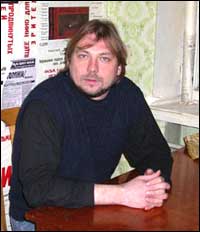 Currently
Andrei Kudinenko is working on the movie "The Last Citizen of the Capital
of the World". This is a mysterium-buff about utopian colony in Western
Belarus (Padlasse, today in Poland) where resident were constructing New
Jerusalem and calling for the end of the World. It is based on a true story. The
original script was written by Turov and developed by Alexander Zaitzev.
Currently
Andrei Kudinenko is working on the movie "The Last Citizen of the Capital
of the World". This is a mysterium-buff about utopian colony in Western
Belarus (Padlasse, today in Poland) where resident were constructing New
Jerusalem and calling for the end of the World. It is based on a true story. The
original script was written by Turov and developed by Alexander Zaitzev.
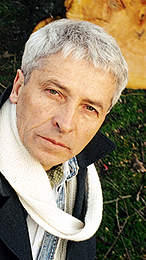 Viktar
Dashuk Documentaries:
Viktar
Dashuk Documentaries:
"Between Satan and God" Guardian Unlimited writes: "Dashuk stands accused of one crime [in Belarus]: making a film. Between Satan and God was the first part in what was envisioned as a trilogy questioning the nature of absolute power and its psychological effect on a country entirely populated by the powerless."
"Long Knives Night" Guardian
Unlimited writes: By the time Dashuk completed 1999's Long Knives Night, the
second part of the trilogy, the harassment had became overt. He received an
unannounced visit from plain-clothed members of the presidential security
service, who refused to identify themselves but demanded he handed over the
videotape of his film, which was subsequently banned.
... For obvious reasons, Dashuk is unable to screen or distribute his remarkable
films in Belarus. Terrible things tend to happen to those who cross Lukashenko.
One political scientist, Anatoly Maisenya, died in a car crash. Others have
simply disappeared. Yury Zakharenko, a former minister of the interior, went
missing on his way home in 1997. Dashuk's friend Dmitry Zavadsky, who worked for
the independent Russian TV channel ORT, left his car parked in front of the
terminal building at Minsk airport but was never seen again"
According to Belarus.nu: This film was presented at the film festival "Tempo" in Stockholm March 16th year 2001. The director of the film, Viktar Dashuk, was him self present at the festival and introduced material that are strictly forbidden in Belarus.
"Report from the Rabbit Hutch" According to Belarus.nu: The Swedish Social Democratic Party has supported (with the financial aid from the Olof Palme International Center) Belarusian director Viktar Dashuk in his making of a documentary about people from the opposition in Belarus, who mysteriously have gone missing. In this secretly filmed documentary, "the Rabbit Hutch", Dashuk shows a terrifying picture of the contemporary Belarus and of the missing opposition representatives. Again, important to emphasize is that the opinions and facts that are presented are the producers own!
In the film Report from a Rabbit Hutch, Viktor Dasyuk, Belarusian film
director, describes his life under the Soviet leaders Stalin, Khrushchev and
Brezhnev and now under Belarus’ Lukashenka. The film was partly funded with
support from the Olof
Palmes Internationella Centrum I-Fund.
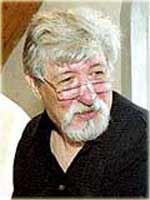 Yuri Haschavacki Documentaries:
Yuri Haschavacki Documentaries:
"The Usual President" ("Obyknovennyj
Prezident") by Yury
Haschavatski
The
movie is available for free downloads from Byelarus.com
Shot in 1996 this documentary took the Peace prize in 1997 Berlin Movie Festival and Sakharov's Award in Russia. Because the movie was critical of the strengthening presidential rule of Aliaksandar Lukashenka the director of the movie was under attack of the regime - physical attacks by secret police who broke both of movie Director's legs. The "hooligans" were never caught by Belarusian state criminal investigators. When the movie was shown in a distant corner of Belarus - a small town of Karelichi on January 22, 1997 - by the moment the documentary was ending KGB arrived to a cable station, broke the locked door, confiscated movie tapes and arrested 19-year old shift manager Maxim Svirid, according to Human Rights Watch. The movie is essentially forbidden in Belarus.
"Oasis" - is a movie about life of people of different nationalities of former USSR that settled in Radioactive No-Person Zone of Chernobyl
"Caucasian Prisoners" - this movie has won a the World Organization Adainst Torture (OMCT) Award (second prize) at the 2nd International Film Festival on Human Rights in Geneva (Warning: don't open Word files at the festival's website - they are infected with macro-virus). This is a movie about Russia-Chechnya war. Pretty horrible one. Based on documentary shots from Chechnya by stringers - independent movie operators, selling their videos to TV channels. These shots were too horrible to be shown on TV. This film has a lot of parallels with today's war in Iraq - shots of beheading of "infidel" Russian solders by Chechens Islamic combatants or tearing in halves Chechen woman-sniper tied to two Russian MPVs. "One can not divide this into Chechens and Russians. One can only divide it into murderers and murdered." - says Haschavacki. "One Russian soldier tried to escape during execution by Chechens. He was chased down and shot. In a sense he was lucky - he was shot, not be-headed like his friends and comrades" - says Edward Jaffarov, stringer/TV operator, who provided Haschavacki with some materials for this movie. The movie blocks most horrendous scenes with just black screen leaving sounds. I think it is wrong. Humanity can't close eyes on its own deeds. We had enough media beautifying war shots, leading people into belief that nowadays war could be "pin-point" and "clean". We need to talk to veterans - those handicapped human souls who survived the horror of war to understand that:
NO WAR IS JUST! ALL WARS ARE BASED ON LIES!
Links:
 "Dikaya
Okhota"("Wild
Hunt") by Pavel Sheremet
(1998 CPJ International Press Freedom Award recipient) made a documentary about Lukashenka
regime in Belarus. The movie deals with reports that vocal opponnents of
Lukashenka regime - filmmaker Dmitry Zavadski, politician Victor Gonchar,
business-man Anatoly Krasovski and former head of the Ministry of the Interior
Jury Zakharenka - disapeared
without trace in Minsk between 7 May 1999 and 7 July 2000. Mr. Sheremet said
that politics factors prevent him now from shooting a sequel
to his documentary Dikaya Okhota [Wild Hunt – about the disappearance of
Dmitri Zavadsky]. Abd they cannot show the Alkayev video [of a former death row
prison chief confirming the allegations that a government-sponsored death squad
was behind the disappearances and possible killings of political opponents.
"Dikaya
Okhota"("Wild
Hunt") by Pavel Sheremet
(1998 CPJ International Press Freedom Award recipient) made a documentary about Lukashenka
regime in Belarus. The movie deals with reports that vocal opponnents of
Lukashenka regime - filmmaker Dmitry Zavadski, politician Victor Gonchar,
business-man Anatoly Krasovski and former head of the Ministry of the Interior
Jury Zakharenka - disapeared
without trace in Minsk between 7 May 1999 and 7 July 2000. Mr. Sheremet said
that politics factors prevent him now from shooting a sequel
to his documentary Dikaya Okhota [Wild Hunt – about the disappearance of
Dmitri Zavadsky]. Abd they cannot show the Alkayev video [of a former death row
prison chief confirming the allegations that a government-sponsored death squad
was behind the disappearances and possible killings of political opponents.
Young Belarusian director Jan Lukashok's short movie "Autopsy" was included recently in David Lynch's anthology of horror. Earlier in 2003 his play "Deaf Aviator" about Soviet arctic pilot Valery Chkalov has received "BramaDu" from German Fund named after A. Merkel.
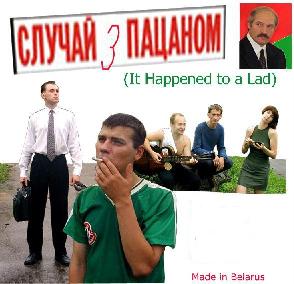 "It
Happenned to a Lad" (Sluchaj z pacanom")
"It
Happenned to a Lad" (Sluchaj z pacanom")
Navinki Home Video, Belarus,
2001
Time: 54 minutes
Director: Sergey Loban
Actors: Yurij Konovalchik, Larisa Nenazzheva
"Following the release of the notorious film "My Name Is Arlekino" in
perestroika times, "It Happened To A Lad" is the Belarusian filmmaking
industry's first attempt to reflect modern youth issues. What's more, it's
a rare example of an independent film actually being made in our country".
- Belorusskaya Delovaya Gazeta
5/09/01
"The first impression after watching the film is that there's never been a
film like this in Belarus before. The atmosphere is one of a farcical carnival.
The film's idea relies on playing with styles, languages, not to mention the
whole of Belarusian life. During the film's original finale, Yura was to get
lost in the political whirlpool, but the producers rewrote the script long
before the elections. It worked, and they landed in the "top ten".
- Radio
Racja 13/09/01
"The film "It Happened To A Lad" is another example of how you can even
have a lot of fun in a totalitarian state if you're reckless enough. Besides
the film's clear political significance, it also has other good points. It's
a relevant, low-budget contemporary film made in music video style, with
frequent animation and computer effects. Instead of traditional comical
realities like the "Brother" films, it gives us the truth about today's
Belarus. And finally, millions of people will be seeing it soon, because a
decent number of copies of "It Happened..." were released with a colour
cover which, incidentally, asserts: "This ain't "Brother 2". This is the
Lad".
-
Mailghetto Delivery (Moscow)
- is a Belarusian director from Polish region of Padlasse, predominantly populated by Belarusian minority. He has been an author of many works about political and Human rights situation in Belarus. Below is the list of his works that have received international acclaim.
"Chernobyl Dwellers" ("Czarnobylcy") - a movie about people living in Chernobyl contaminated areas. Prix of European Union of Regional TV stations - Circom Regional - Current Affairs Programmes at Porto, Portugal. 2003 - Grand Prix of International festival of Ecologic Movies "Ecoforum" in Belska-Biala.
"Chase for Truth". The movie reports the situation around the politically charged arrest of two journalist of "Chase" newspaper in Hrodna and gives a general background about freedom of speech situation in Belarus. 2002 - Grand Prix of Austrian division of the Reporters Without Borders. 2003 - 2nd prize at the International Festival of documentaries in Lublin, Poland. Nomination at Film Festival in Volader, Mexico. 1st prize on the Review of Journalist Reports of Regional TV.
"The Last Dictator of Europe" - movie about the power enforcement mechanisms of Lukashenka regime. 2004 - Awarded at Alamunka, Czhech Republic.
Links:
My Name Is Harlequin (Menya Zovut Arlekino)
1988 - USSR - Crime Drama/Teen Movie/Urban Drama/Juvenile Delinquency Film
Starring Svetlana Kopylova, Oleg Fomin, Lyudmila Gavrilova, Vladimir Pozhidaev, Stanislav Pshevlotsky. Directed by Valeriy Rybarev. (NR, 134 minutes).
"A group of
teens living in Minsk, Byelorussia, have formed a brutal gang which they call
"The Commuters," perhaps because this is the group they prey upon.
Each of them considers their prospects in life without money or influence, and
none of them, seemingly, has much to look forward to."
- The New York Times
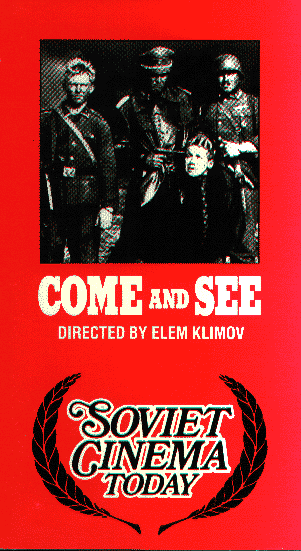
"Set in 1943 German-occupied Belarus, the film follows an adolescent boy through
the nightmare that is war."
- IFEX International Video
"Come and See", based on a historical genocide, renders excruciatingly
fresh
the grief and madness of war."
- The Village Voice
Great beauty...Hypnotically sensual...It is a remarkable cinematic achievement."
- Los Angeles Herald Examiner
The movie is graphically arresting. It is showing one by one the images that are imprinted in every Belarusian's mind. As I was watching it the stories of my grandma about the horrors of German occupation were constantly reemerging from the farthest corners of my memory. It is extremely powerful movie. Anyone who wants to understand why Belarus is all covered with WWII memorials should see this movie. It shows the tragic last days of the Belarusian village whose inhabitants were burned alive in SS punishment operation. 628 Belarusian villages were burned by fascists with their entire population burned ALIVE during WWII. Every forth Belarusian perished during WWII. The tragic fate of the burned villages is commemorated in Khatyn' WWII Memorial near Minsk. Khatyn' was only one village with such a horrible fate. A handful of soil was brought from each of 628 villages where fascists burned alive their inhabitants and a symbolic Graveyard of Villages was founded in Khatyn'. Every hour the bells of Khatyn' are ringing to remind us about the horrible crimes that a human nature is capable of. Today the younger and happier generation prefers not to think about our history and look to the future, not to the past. But the safe future could only be built with a good memory of our past. COME AND SEE if you don't want it ever happen again."
This movie is released in US by IFEX International Video. You can purchase it from N.Y.C. Kino video. "Come and See" is also carried by REEL video rental. You can also buy it here.
Not exactly Belarusian Cinema, but
related, and I love Ruichi Sakamoto!.
Directed by Seiichi Motohashi
Produced by Tokio Komatsubara, Sadako Kamiya.
Photographed by Ichinose Masafumi
Music by Ruici Sakamoto
This charming documentary captures village life in Budische, a Belarus town 180 km from Chernobyl. Although designated for extinction by authorities because of its proximity to the site of the 1986 nuclear disaster, the town is still inhabited by 56 elderly villagers and one younger man, Alexi, who decided to stay. Today, Alexei and the village's miraculously uncontaminated water spring provide hope for the inhabitants, who are able to envision a bright future despite their traumatic past. ... Legendary composer Ruichi Sakamoto's soundtrack mirrors the haunting beauty of this cinematic feast.
"Chernobyl Heart" by Maryann De Leo
and Adi Roche.
Again, not a Belarusian movie, but a movie about very important to
Belarus topic - Chernobyl radioactive disaster and International charities
helping Belarusian children affected by radiation.
 United
Nations and Oscar-Winning Documentary To Highlight Ongoing Devastation of Chernobyl Disaster
United
Nations and Oscar-Winning Documentary To Highlight Ongoing Devastation of Chernobyl Disaster
"Chernobyl
Heart" a 39-min documentary by Maryann De Leo (A Downtown TV
Documentaries Production) shot over a two year period in Belarus has won
this year's Oscar for Best Documentary Short Subject at the 76th
Academy Awards! "Our hope is that the publicity
gained from this great achievement will help to once again highlight the
plight of the victims and survivors of the World's worst environmental
disaster" - said Adi Roche, Executive Director of The
Chernobyl Childrens Project, featured in the documentary. This Chernobyl
charity organization started
in Cork, Ireland in 1991 and supported
by U2 has grown into an
international project for support of Chernobyl radioactive disaster
victims
 Anastasia
of Slutsk
Anastasia
of Slutsk
Belarusian movie "Anastasia of Slutsk" by Yury Yelkhov was awarded
with a platinum prize and a diploma in the category of Adventure film at
the World Film Festival in Houston.
Elena Igrusha and Zhanna Kapustnikova were awarded with a golden prize and
diplomas in the best costumes categories.
This movie is a grand state sponsored full feature movie that was heavily spun by Lukashenka regime as their contribution into Belarusian heritage. A large set of wooden castle was built and accidental fire destroyed it through 2/3 of the movie shooting. Still one can see it as a rare effort to develop Belarusian topic in Post Soviet times and kick it out off the usual WWII topic of BelarusFilm.
Links
some contact information
o Belarusian
State Archives of Films, Photographs and Sound Recordings
- contains over 211,000 items of documentary photographs, 29,000 items of film
documents, about 10,000 items of sound recordings (including 2,3 thousand
phonograph records), covering history from the end of the 19th century to
the present
o
Belarusian
State Academy of Arts
- an official higher education institution for
TV/Cinema industry. Funny fact: it takes 6 years to educate an artist there
and 5 years for an art critic :)
o Belarus Film
Main Belarusian feature movie studio. Only address:
98 Scaryna Prospect, Minsk 220023, Belarus.
Department of musical programming of Belarus Film:
Ph: (011-375-17)-2338820
o The National State Teleradiocompany of the Republic of Belarus - this is pretty much the only game in town TV-wise in Belarus. All channels are government controlled and hence express pro-government views. Recent laws promise up to 5 years of imprisonment for saying things that the Last Dictator of Europe doesn't like. Well there are some cables, lots of satellite dishes and border regions receive TV programming from Poland, Lithuania, Latvia, Russia and Ukraine. But it's pretty bad - 90% is all Soviet-type happy socialist future propaganda.
o Consorcium TeleFilm
I believe it's our documentary TV studio:
Chief Editor - Pavlov Nikolai Georgievich: (011-375-17)-2639098
Art director - (011-375-17)-2639719.
o Cinema Technologies Group - Professional Movie Cameras and other related technology from Belarus
o Belarus Productions - an independent production company based in Minsk, Belarus, offering a full range of production services to television, video and film production companies and corporates wishing to film in Belarus, as well as to print journalists.
"Vse belorusskie fil'my" ("All Belarusian Movies") Vol. 1 & 2. I.O. Avdeev, L.N. Zajceva, Publishing house "Belaruskaia navuka", Minsk 1999. ISBN 985080348-7. - The best source!
"Sovetskaia kinodramaturgiia" ("Soviet cinematography") L.I. Belova, Moscow, 1981.
"Istoriya belorusskogo kino" ("History of Belarusian cinema") (Vol. 1-2) Minsk, 1969-1970.
"Kino sovetskoj Belorussii" ("Cinema of Soviet Byelorussia") Moscow, 1975.
"Ekran zemli belorusskoj" ("Movie screen of Belarusian land") A.V. Krasinskij, Moscow, 1973.
 This file is a part of
the Virtual Guide to Belarus - a collaborative project
of Belarusian scientists and professionals
abroad. VG brings you the most extensive compilation of the information about Belarus on
the Web.
This file is a part of
the Virtual Guide to Belarus - a collaborative project
of Belarusian scientists and professionals
abroad. VG brings you the most extensive compilation of the information about Belarus on
the Web.
Please send your comments to the authors of VG to
Belarus
History | Statehood | Culture | Law and
Politics | Cities | Nature and Geography |